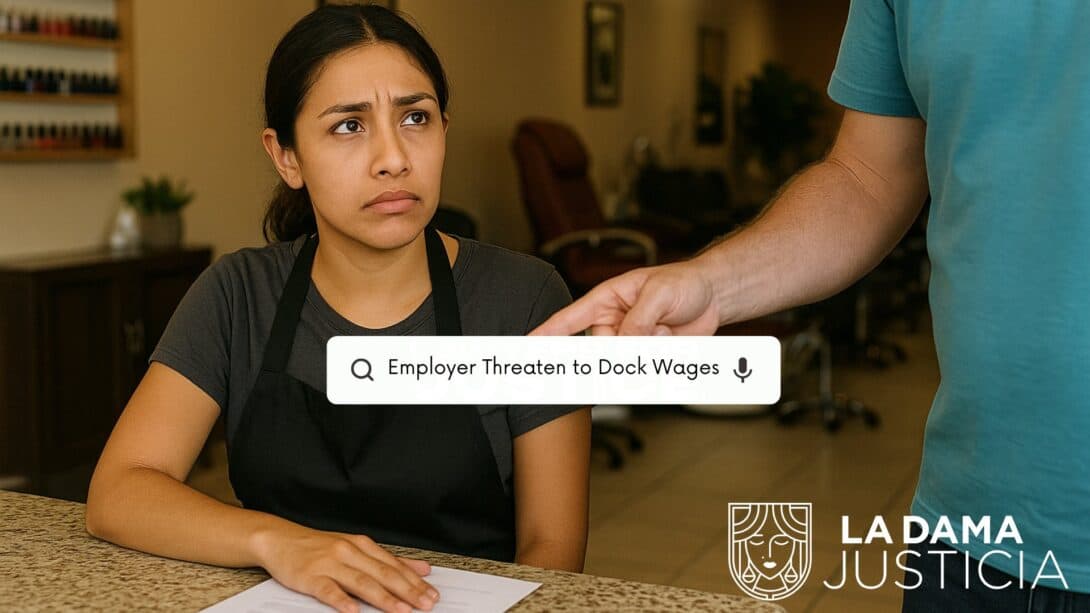In California, wage protection laws are strict, heavily enforced, and offer strong safeguards against employer misconduct. One area that often causes confusion and anxiety among workers is whether an employer can threaten to dock their pay and if they can legally follow through on that threat.
If your employer has said they will reduce your wages, withhold your paycheck, or deduct money as a form of punishment or discipline, it’s crucial to know your rights. In most cases, threatening to dock your wages is not only unethical, it’s illegal under California labor law.

What Does “Docking Wages” Mean?
Docking wages refers to when an employer withholds a portion of an employee’s pay, either by deducting money from a paycheck or by reducing future earnings. A docking wages threat can be offered for being late, making a mistake, violating a rule, recovering company losses (like damaged property, lost equipment, or cash register shortages), or maybe even covering the cost of uniforms, tools, or training. While some wage deductions are legal under certain conditions, employers are prohibited from docking wages as a form of punishment or retaliation in most circumstances.
California Law on Wage Deductions
According to California Labor Code § 221, it is unlawful for an employer to collect or receive any part of an employee’s wages if it was already earned. Even threatening to do so may constitute coercion, retaliation, or a hostile work environment, which are actionable under California employment law.
Is It Illegal to Dock a Salaried Employee’s Pay?
While salaried employees operate on slightly different rules and measures when compared to hourly employees, they are still protected under State and Federal laws to have their pay protected from negligent employers. An employer cannot dock a salaried employee’s pay for absences, or as a means to retaliate against the employee. If they do, the employer can be held liable and subjected to penalties.
When Are Wage Deductions Allowed?
While most deductions are illegal, there are narrow exceptions where deductions may be permitted, but they typically occur with the employee’s express authorization or when required by law. For example, court order deductions (child support, levies, wage garnishments, etc.) and federal and state tax deductions are some instances of legal deductions.
However, if an employer deducts your wages because you broke work equipment, or if they withhold your pay as a punishment for failing to meet a sales quota or performance goal, then they can be held liable for wage theft and be subjected to a series of fines and penalties. On top of it all, if an employer threatens to illegally deduct your wages, it may also serve as grounds for a valid wage claim under California law.
Is It Legal to Threaten to Dock Wages?
Even if the employer doesn’t follow through, the threat of docking wages may still violate labor laws. If a worker reports harassment, discrimination, or wage violations, and the employer responds by threatening to dock their pay, it may be considered unlawful retaliation under California Labor Code § 1102.5, California Labor Code § 98.6, and Fair Employment and Housing Act (FEHA).
Depending on the severity of the threat and the outcome of the situation, employees who are threatened may have the grounds to file a claim and recover compensation for the employer’s negligence. As these threats can create a hostile work environment, coerce employees into silence, or be used as a form of retaliation, it is more important than ever for employees to understand their rights so they can get the legal assistance they need.
Lawyers for Justice, PC Can Help
Under California law, your wages are protected and employers are not allowed to use threats of wage deductions as a tool to punish, intimidate, or manipulate you. If your employer has docked your wages, or even just threatened you, you have the right to stand up for yourself without fearing retaliation.
At Lawyers for Justice, PC, we help California workers recover unpaid wages and fight back against retaliation. Our team of attorneys are committed to helping clients and we treat every case with the utmost care and respect it deserves. Don’t wait for justice, take the first step to reclaim your rights.
Contact us today by calling (818) JUSTICE or by filling out our online contact form for a free case review!